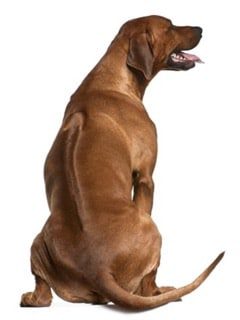
The Rhodesian Ridgeback is a large, powerful breed that originated in South Africa, and has a long and independent history. It is believed to have been ‘created’ from a combination of many breeds, including Greyhounds, Mastiffs, Bloodhounds, Terriers and perhaps some other smaller breeds. Physically, the Rhodesian Ridgeback is athletic and well-muscled, typically ranging in height from 24–27 inches and weighing around 80–90 pounds. Its most distinctive feature is its ridge of hair along the spine that runs in the opposite direction to the rest of the coat. This ridge is caused by two bands of genes located on the same chromosome. Common fur color variations for this breed include various shades of red, fawn, wheaten, and brindle. They also tend to have a smooth, short coat and erect ears. What makes the Rhodesian Ridgeback so special is its loyal, independent, and protective nature. They are inquisitive and alert, and enjoy engaging in activities such as running and retrieving games. They have a strong, loyal bond with their family and make devoted companions. Despite their impressive physical abilities, their gentle temperaments make them excellent family dogs.s
The Rhodesian Ridgeback is an affectionate, loyal, and gentle breed with an independent and strong-willed personality. They are intelligent, playful, and confident, making them an excellent family pet. Despite their strength, Rhodesian Ridgebacks are known for their patient and tolerant behavior with both people and other animals. They do well with children, especially when socialized early and handled gently. It is important to start early obedience training as they can become strong-willed, particularly when not given enough exercise. They have high energy levels and require regular exercise, such as daily walks, runs, and playtime. Although they can adapt to living indoors, they prefer to have access to a large, securely fenced yard to fulfill their exercise needs. They can be quite vocal at times, but overall they are a relatively quiet breed that has been known to form strong, loving bonds with their owners.
The Rhodesian Ridgeback is a muscular and athletic working dog breed that originated in Southern Africa. They require a balanced diet of high-quality protein, healthy fats, whole grains, and fresh vegetables and fruits. Specific dietary requirements may also be necessary if your Ridgeback has a medical condition. It is important to feed this breed appropriate quantities of food based on their activity level, size, and age. Puppy Ridgebacks may require more protein-rich diets than adult dogs. Responsible owners should consult with a veterinarian to ensure their pet’s nutritional needs are met. To prevent obesity, it’s also important to limit treats and monitor caloric intake. Responsible adoptions and ownership are key to keeping dogs healthy and happy. If you own a Rhodesian Ridgeback, be sure to check out Way Canina to learn more about their needs. They provide detailed dietary guidelines that include what foods are acceptable for your Ridgeback and which ones you should avoid. With love, attention, and a healthy diet, pet owners can ensure their Rhodesian Ridgeback has the perfect balance of nutrition and health.
It is very important to provide your dog with regular veterinary check-ups to monitor any common health issues including hip dysplasia, hypothyroidism, and eye infections such as entropion and ectropion. Vaccinations and other forms of preventive care are also important for your dog’s health. This breed is relatively easy to groom, requiring regular brushing, bathing, and ear cleaning. It is also important to provide your Rhodesian Ridgeback with a balanced diet portioned to their size, as well as regular exercise to avoid obesity.
The Rhodesian Ridgeback is a strong and active breed of dog. They have a typical lifespan of 10-12 years, though genetics, diet, exercise, and healthcare can impact their lifespan and longevity.
Are you thinking about getting a Rhodesian Ridgeback? Before making a commitment to bring a Ridgeback into your life, it’s important to consider all the responsibilities and pros and cons of caring for this breed. We have comprehensive blog posts and articles on Way Canina that can help you compare different breeds and discover the lifestyle and wellbeing needs each breed has. Head to our website to find out more!